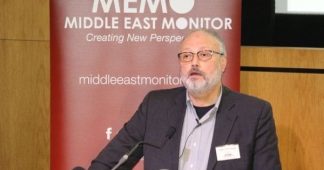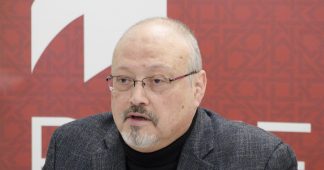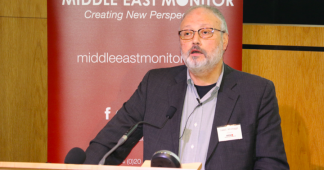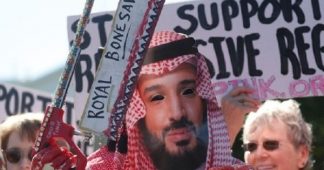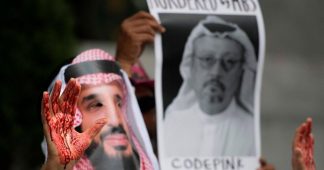By: Andre Vltchek
12 Nov., 2018
It appears that the KSA has crossed all lines of decency, if there were ever any.
In the eyes of many in the West, it crossed them notbecauseit has been brutally killing tens of thousands of innocent people in Yemen, not even because it keeps sponsoring terrorists in Syria, (and in fact all over the world), often on behalf of the West. And not even because it is trying to turn its neighboring country, Qatar, from a peninsula into an island.
The crimes against humanity committed by Saudi Arabia are piling up, but the hermit kingdom (it is so hermit that it does not even issue tourist visas, in order to avoid scrutiny) is not facing any sanctions or embargos, with some exceptions like Germany. These are some of the most barbaric crimes committed in modern history, anywhere and by anyone. Executing and then quartering people, amputating their limbs, torturing, bombing civilians.
But for years and decades, all this mattered nothing. Saudi Arabia served faithfully both big business and the political interests of the United Kingdom first, and of the West in general later. That of course includes Israel, with which the House of Saud shares almost a grotesque hatred towards Shi’a Islam.
And so, no atrocities have been publicly discussed, at least not in the Western mass media or by the European and the US governments,while weapons, worth hundreds of billions of dollars, have been arriving into the KSA, and the oil, that dark sticky curse, kept flowing out.
Was Riyadh enjoying total impunity? Definitely!
But all this may soon stop, because of a one single man, Mr. Jamal Khashoggior more precisely, because of his alleged tragic, terrifying death behind the walls of theSaudi Consulate in the city of Istanbul.
According to the Turkish authorities, quoted by The New York Times on October 11, 2018:
“Fifteen Saudi agents arrived on two charter flights on Oct. 2, the day Mr. Khashoggi disappeared.”
Supposedly, they brutally murdered Mr. Khashoggi, a Saudi citizen, and then they used sawmills to severe his legs and arms from the body.
All this, while Mr. Khashoggi’s Turkish fiancé, HaticeCengiz, was waiting for him on a bench, in front of the consulate. He went in,in order to take care of the paperwork required to marry her. But he never came back.
Now the Turkish nation is indignant.
Ten years ago, even one year ago, everything would have been, most likely, hushed up. As all mass murders committed by the Saudis all over the world were always hushed up. As was hushed up the information about the Saudi royal family smuggling drugs from Lebanon, using their private jets – narcotics thatare clouding senses and are therefore used in combat zones and during terrorist attacks.
But now, this is the end of 2018. And Turkey is not ready to tolerate an atrocity by an increasingly hostile country; an atrocity committed in the middle of its largest city. For quite some time, Turkey and the KSA are not chums, anymore. Turkish military forces were already deployed to Qatar several months ago, in order to face the Saudi army and to protect thesmall (although also not benign) Gulf State from possible attack and imminent destruction. In the meantime, Turkey is getting closer and closer to Iran, an archenemy of Saudi Arabia, Israel and US.
It has to be pointed out that, Mr. Khashoggi is not just some common Saudi citizen – he is a prominent critic of the Saudi regime, but most importantly, in the eyes of the empire, a correspondent for The Washington Post. Critic but not an ‘outsider’. And some say, he was perhaps too close to some Western intelligence agencies.
Therefore, his death, if it is, after all, death, could not be ignored, no matter how much the West would like the story to disappear from the headlines.
President Trump remained silent for some time, then he became “concerned”, and finally Washington began indicating that it could even take some actions against its second closest ally in the Middle East. The Saudi Crown Prince Mohammed bin Salman has been ‘cultivated’ both by Washington and other Western powers, but now he may actually fall from grace. Is he going to end up as Shah Pahlavi of Iran? Not now, but soon, or at least ‘at some point’? Are the days of the House of Saud numbered? Perhaps not yet. But Washington has track record of getting rid of its ‘uncomfortable allies.
* * *
The Washington Post, in its editorial “Trump’s embrace emboldened Saudi Crown Prince’, snapped at both the ‘Saudi regime’ (finally that derogatory word, ‘regime’ has been used against the House of Saud) and the US administration:
“Two years ago it would have been inconceivable that the rulers of Saudi Arabia, a close US ally, would be suspected of abducting or killing a critic who lived in Washington and regularly wrote for the Post – or that they would dare to stage such operation in Turkey, another US ally and a NATO member. That the regime now stands accused by Turkish government sources of murdering Jamal Khashoggi, one of the foremost Saudi journalists, in the kingdom’s Istanbul consulate could be attributed in part to the rise of Crown Prince Mohammed bin Salman, the kingdom’s 33-year-old de facto ruler, who has proved as ruthless as he is ambitious. But it also may reflect the influence President Donald Trump, who has encouraged the Crown Prince to believe – wrongly, we trust – that even his most lawless ventures will have the support of the United States.”
“Wrongly, we trust?” But Saudi Arabia and its might are almost exclusively based on its collaboration with the global Western ‘regime’ imposed on the Middle East and on the entire world, first by Europe and the UK in particular, and lately by the United States.
All terror that the KSA has been spreading all over the region, but also Central Asia, Asia Pacific, and parts of Africa, has been encouraged, sponsored or at least approved in Washington, London, even Tel Aviv.
The Saudis helped to destroy the Soviet Union in Afghanistan, and then the socialist and progressive Afghanistan itself. They fought Communism and all left-wing governments in the Muslim world, on behalf of the West. They still do.
Now both the West and the KSA are inter-dependent. The Saudis are selling oil and buying weapons, signing ‘monumental’ defense contracts with the US companies, such as Lockheed Martin. They are also ‘investing’ into various political figures in Washington.
The current alleged murder of a journalist triggered an unusual wave of soul-searching in the Western media. It is half-hearted soul searching, but it is there, nevertheless. On October 2018, the Huffington Post wrote:
“By directing billions of dollars of Saudi money into the U.S. for decades, Riyadh’s ruling family has won the support of small but powerful circles of influential Americans and courted wider public acceptance through corporate ties and philanthropy. It’s been a solid investment for a regime that relies heavily on Washington for its security but can’t make the same claims to shared values or history as other American allies like Britain. For years, spending in ways beneficial to the U.S. ― both stateside and abroad, such as its funding Islamist fighters in Afghanistan to combat the Soviet Union ― has effectively been an insurance policy for Saudi Arabia.”
It means that the White House will most likely do its best not to sever relationships with Riyadh. There may be, and most likely will be, some heated exchange of words, but hardly some robust reaction, unless all this tense situation ‘provokes’ yet another ‘irrational’ move on the part of the Saudis.
The report by Huffington Post pointed out that:
“One of the few traditions in American diplomacy that Trump has embraced wholeheartedly is describing weapons sales as jobs programs. The president has repeatedly said Khashoggi’s fate should not disturb the $110 billion package of arms that Trump says he got the Saudis to buy to support American industry. (Many of the deals were actually struck under Obama, and a large part of the total he’s describing is still in the form of vague statements of intent.)
Keen to keep things on track with the Saudis, arms producers often work in concert with Saudi Arabia’s army of Washington lobbyists, congressional sources say.”
This is where the Western reporting stops short of telling the whole truth, and from putting things into perspective. Nobody from the mainstream media shouts: ‘There is basically no independent foreign policy of Riyadh!’
Yes, oil buys weapons that are ‘giving jobs to men and women working in the US and UK factories’, and then these weapons are used to murder men, women and children in Afghanistan, Yemen, Syria and elsewhere; they threaten Iran, Qatar and several other countries. Oil and Western support also help to recruit terrorists for the perpetual wars desired by the West, and they also help to build thousands of lavish mosques and to convert tens of millions of people in Southeast Asia, Africa and elsewhere to Wahhabism, which is an extreme, Saudi-UK religious dogma. (My book “Exposing Lies of the Empire”. contains important chapter on this topic – “The West Manufacturing Muslim Monsters: Who Should Be Blamed for Muslim Terrorism”).
* * *
Despite what many in the West think, there is hardly any love for Saudi Arabia in the Middle East. The KSA is sometimes supported, out of ignorance, commercial interests, or religious zeal, by such far-away Muslim countries like Indonesia and Malaysia, but as a rule, not bythose who live ‘in the region’.
Many if not most in the Arab countries havealready had enough of Saudi arrogance and bullying, by such monstrous acts like the war against Yemen, or implanting/supporting terrorists in Syria, Afghanistan, Libya and elsewhere, or by recent the de facto kidnapping of the Lebanese Head of State, by moral hypocrisy and by turning holy Muslim sites into business ventures with vulgar commercialism all around them, and the clear segregation of the rich and poor.
Many Arabs hold Saudi Arabia responsible for turning an essentially socialist and egalitarian religion into what it has become now, of course with the determined support from the West, which desires to have an obedient and rituals-oriented population all over the Muslim world, in order to control it better, while plundering, without any opposition, its natural resources. Saudi Arabia is a country with some of the greatest disparities on earth: with some of the richest elites on one hand, and widespread misery all around the entire territory. It is an ‘unloved country’, but until now, it has been ‘respected’. Mainly out of fear.
Now, the entire world is watching. Those who were indignant in silence are beginning to speak out.
Few days ago, an Indonesian maid was mercilessly executed in the KSA. Years ago, she killed her tormentor, her old ‘a patron’ who was attempting to rape her, on many occasions. But that was not reported on the front pages. After all, she was ‘just a maid’; a poor woman from a poor country.
All of us, writers and journalists all over the world, are hoping that Mr. Khashoggi(no matter what his track record was so far) is alive, somewhere, and that one day soon he will be freed. However, with each new day, the chances that it will happen are slimmer and slimmer. Now even Saudi officials admit that he was murdered.
If he was killed by Saudi agents, Mr. Khashoggi’s death may soon fully change both his country and the rest of the Middle East. He always hoped for at least some changes in his country. But most likely, he never imagined that he would have to pay the ultimate piecefor them.
This time, the Saudi rulers hoped for a breeze, which would disperse the smell of blood. They may now inherit the tempest.
* * *
* Andre Vltchek is a philosopher, novelist, filmmaker and investigative journalist. He has covered wars and conflicts in dozens of countries. Three of his latest books are Revolutionary Optimism, Western Nihilism, a revolutionary novel “Aurora” and a bestselling work of political non-fiction: “Exposing Lies Of The Empire”. View his other books here. Watch Rwanda Gambit, his groundbreaking documentary about Rwanda and DRCongo and his film/dialogue with Noam Chomsky “On Western Terrorism”. Vltchek presently resides in East Asia and the Middle East, and continues to work around the world. He can be reached through his website and his Twitter.
